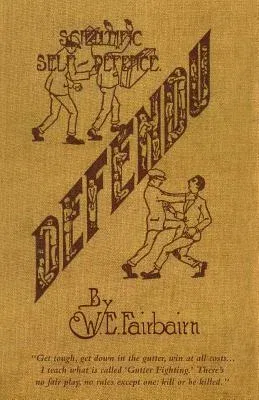The Fairbairn's system was based on his training and knowledge in
boxing, wrestling, savate, jujutsu, judo and fights he was involved in
during his police work, Fairbairn began to develop his own system of
hand to hand combat, initially referring it as "Defendu". It was
designed to be simple to learn and to provide effective results.
Fairbairn published his book, Defendu, in 1926[2] (reprinted as
Scientific Self Defence in 1931), illustrating this method and it is
here that the term "Defendu" first appeared This confused early readers
of the book, who assumed that the techniques within had been based
mainly in the Eastern martial arts that Fairbairn had learned. Thus, in
an attempt to highlight the originality of Fairbairn's material, the
term did not appear in the 1931 edition of the book.
Fairbairn was called upon by the British to help train Allied troops in
World War II. Fairbairn and others expanded on this system to create the
Close Quarters Combat system that was then taught to the troops. This
system was built on Defendu, but modified for military applications,
rather than police and riot control.
The original Defendu was oriented towards self-defence and restraint,
while the Close Quarters Combat system concentrated on rapid disabling
of an opponent, with potentially lethal force. The militarised version
of Defendu is described in the military manual All in fighting 1942,
used as a supplement during WW2 CQB-training. This book was later
published in a civilian edition, missing the chapters on
bayonet-fighting and rifle sighting, under the name Get Tough! How To
Win In Hand-To-Hand Fighting. As Taught To The British Commandos And The
U.S. Armed Forces. Fairbairn's CQC-system is also described in Rex
Applegate's book Kill or Get Killed.
Publications:
Defendu
Scientific Self-Defence
All-In Fighting
Get Tough
Hands Off! (Self Defence for Women and Girls)
Shooting to Live
All of Fairbairn's works are published and available from The Naval &
Military Press.


